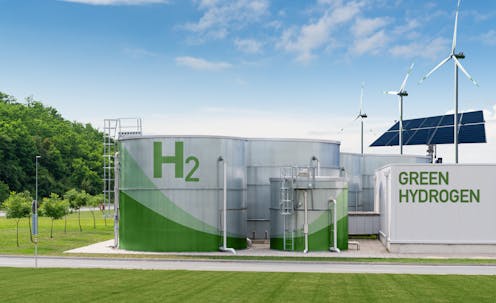Hope or hype? NZ needs to be realistic about the clean energy potential of green hydrogen
- Written by The Conversation

The recent failure of a deal to deliver hydrogen-powered trucks to New Zealand, and the removal of a NZ$100 million government rebate scheme for green hydrogen users in the 2024 budget, make a transition to the much-lauded energy technology increasingly less certain.
The government had invested $6.5 million for the purchase of up to 25 heavy freight hydrogen trucks as part of a wider energy strategy due by the end of the year. But the US company Hyzon, which makes hydrogen fuel-cell trucks and had been modifying diesel trucks to use hydrogen, pulled out at short notice.
Nonetheless, interest in hydrogen for future transport and energy systems has soared globally, and New Zealand is no exception. But we argue that critical voices have been largely missing from the debate here.
In New Zealand, green hydrogen (which is produced with electricity from renewable sources) has attracted government support of $186.3 million from 2017 to 2023. This provided funding for a hydrogen refuelling network, vehicle conversions and purchases, research, and the establishment of the New Zealand Hydrogen Council (now Hydrogen New Zealand).
Proponents of green hydrogen argue it is essential for fuelling economic sectors they believe will be hard to decarbonise by direct electrification. As well as heavy road transport, this includes shipping and fertiliser production.
But opinions differ considerably on which sectors to focus on, and whether hydrogen is the best choice.
Evolution of the narrative
In the wake of the previous government’s ban on new offshore oil and gas exploration, the 2019 H2 Taranaki roadmap outlined a vision for the region as a leader in hydrogen production.
Former energy minister Megan Woods reinforced this, indicating her government would be interested in any associated economic opportunities. This largely positive narrative continued in two further government reports.
The first, A Vision for Hydrogen in New Zealand, suggested the case for hydrogen was already settled:
Hydrogen is poised to fulfil its potential as a clean alternative to hydrocarbons in the global pursuit of decarbonisation to address climate change.
Development of green hydrogen was largely implicit in the second report, the Interim Hydrogen Roadmap, which aimed to:
optimise the potential for green hydrogen to contribute to New Zealand’s emissions reductions, economic development, and energy sector to the extent compatible with our broader electrification goals.
We analysed these reports using a content analysis approach focused on identifying how often strengths, weaknesses, opportunities or threats are mentioned. This revealed the words “opportunities” and “challenges” were used frequently, while “weaknesses” and “threats” were absent.
The use of “strengths” was confined to perceived advantages of New Zealand as a location for hydrogen production. Where difficulties were identified, they were framed as challenges rather than weaknesses.
This optimistic tone is generally reflected in descriptions of several government-funded projects, including green hydrogen research at GNS Science, and international collaborations such as the German-NZ Green Hydrogen alliance.
Media reports have typically reflected the enthusiastic narrative. Of 83 articles on green hydrogen published in New Zealand between 2019 and 2023, only 15 (18%) contained any critical analysis.
Critical voices need to be heard
While some experts have voiced serious concerns about green hydrogen, this has not featured prominently in the debate in New Zealand.
For example, research by University of Cambridge engineering expert David Cebon shows battery electric vehicles are superior to hydrogen vehicles for heavy transport.
The emergence of fast (five minutes or less) automated and manual battery-swap systems, which provide an alternative to high-powered fast-charging systems, supports this point.
Climate and energy strategist Michael Barnard, who covers the green hydrogen debate extensively, writes:
Since 2000, application after application of hydrogen has found it to be inefficient, ineffective and expensive compared to obvious alternatives.
A German rail company which launched the world’s first hydrogen line last year has since opted for cheaper all-electric trains. Rising costs have also forced one Austrian state to abandon plans to introduce hydrogen buses.
Recent research suggests developments in battery-run and fast-charging electric trucks could soon make hydrogen fuel cells superfluous in road transport in most cases.
UK energy analyst Michael Liebreich has quantified the immense scale, significant impracticalities, enormous subsidies and costs associated with green hydrogen.
Liebreich’s “hydrogen ladder” ranks both actual and potential uses. It provides an evidence-informed guide on where to best focus attention and resources. Based on this, the previous government’s funding for the manufacture of green fertiliser (for which hydrogen is an input) was a sensible allocation.
In New Zealand, a 2019 report sponsored by industry and the government, and a letter from the Parliamentary Commissioner for the Environment, have both provided some critical analysis of the potential for green hydrogen.
Towards a new narrative
The previous government’s commitment to finalise New Zealand’s hydrogen strategy, and to deliver an overall energy strategy, remains in place. But we need a more nuanced perspective.
This must start with an acknowledgement that hydrogen is an energy carrier (which has to be produced from other sources of energy), and not an energy resource like solar radiation, wind or hydro.
We need an approach that can continue to adapt to changes in “hard to abate” sectors of the energy system. Critiques of green hydrogen need to enter the discussion if we are to make informed choices.
Government policy on this topic must be informed by independent advice free from commercial interests. A new green hydrogen narrative will enable us to focus our limited resources on applications with the best chance of delivering on New Zealand’s decarbonisation and sustainability aspirations.
This could include key New Zealand industries switching from fossil fuels to hydrogen to produce green steel, green ammonia and fertiliser and green methanol.
The authors are grateful to Paul Callister for his helpful comments and suggestions.







